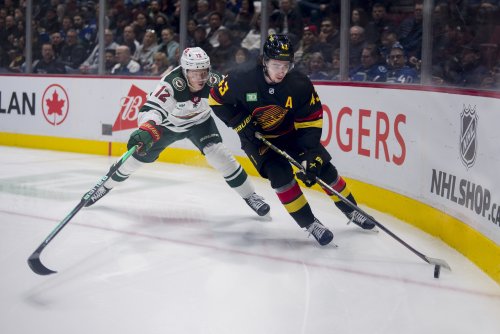
If you watch hockey often enough and with the right people, you might hear them say that you only really notice a defenseman on the ice when he is doing something wrong. For the most part, the Minnesota Wild's roster is full of players like this. Jonas Brodin, Jared Spurgeon, and Marco Scandella are fantastic players on defense whose effort often goes unnocited unless they're unleashing powerful shots from the point or laying big checks.
More than any of those players, it's can be easy to miss many of the 27+ minutes a night played by Ryan Suter. He's been compared to Nicklas Lidstrom in his defensive styling. He's a stay-at-home, cerebral, defensive defenseman who gives the Wild a chance to stay in the game by holding the zone, making well-timed checks, and laying himself out to make the big block.
But in the waning moments of yesterday's matchup between the Wild and the Winnipeg Jets, Suter was really, really noticable for the absolute wrong reasons. After a brief stretch in which the Wild looked like they might be able to regain control of the game, the Jets pushed back, taking control of the puck.
As the Jets and Wild took a faceoff with just over 3 minutes left in the game, the puck came free toward the left half-wall and Suter sacrificed his body to save the play as the Jets tried to toss the pick forward off the wall. In that instant, Suter's long vision was short and his understanding of the game gave way to a split-second reaction. He neglected the fact that the flow of the play to that point had meant he was the last defenseman back.
The Jets' control of the puck had meant that Nikolaj Ehlers was in the process of breaking to the middle of the ice awaiting an outlet pass. Because the Wild hadn't really played their own system all night, instead mimicking the Jets', there was no second defenseman as deep coverage, as is often the case. Instead, there was open ice and a beseiged Devan Dubnyk. And a few short seconds later, there was a goal Ehlers' first in 15 games, and there were a lot of dejected Wild fans.
It's not pretty, but check out the video of the play from NHL.com In truth, the Wild had played a rough game the whole night.
Throughout the night, the Wild had played a game that was decidedly not their own.They had searched for a rhythm on offense, but it looked more like they were trying to learn something new than apply something tried and true. They couldn't stick to the puck well enough to get back into the game save for a few small stretches. Their checking was lackluster compared to the Jets' and they looked like a team that was confused about its identity. Fundamentally, to play the game the way the Wild did yesterday is to try to mimic something the Jets already have practiced.
For Suter to commit to the puck when and where he did is a play that only works in two situations. If the Wild's systematic defensive structure is working the way it is supposed to, Suter isn't the last D back on that kind of play and his pinch means Ehlers' uncontested breakaway is suddenly contested. It also works if you've executed defensive and checking pressure the way the Jets like to for the entire game. Wearing opponents down through checks means Ehlers might have had less energy and a D could have caught up to him along the race down the ice. Unfortunately the Wild were never really in either of those systems yesterday.
They were a team confused about its own identity, caught in what appears to be more and more a product of Mike Yeo's desire for grit over speed and skill. Sure, injuries throughout the lineup have forced them to make undesirable callups, but in the end, the gameplanning can either play to the skills of the best remaining players or against them, in order to shift the game to best fit the new callups.
It's hard to say that the latter is more desirable, but that appears more and more the case. Suter's play exemplified that confused mentality and sapped the Wild's energy, giving the game up with 3 minutes of solid play left. Committing to the puck when and where he did was a feature of a system the Wild do not play, but also one which is familiar to a better-executed version of the Wild's defensive system. If executed correctly, it was a play which could have saved the Wild's afternoon and given them a chance to take hold of the game one last time. Unfortunately for viewers, fans, and the team, it wasn't.
Think you could write a story like this? Hockey Wilderness wants you to develop your voice, find an audience, and we'll pay you to do it. Just fill out this form.









Recommended Comments
There are no comments to display.
Join the conversation
You can post now and register later. If you have an account, sign in now to post with your account.
Note: Your post will require moderator approval before it will be visible.